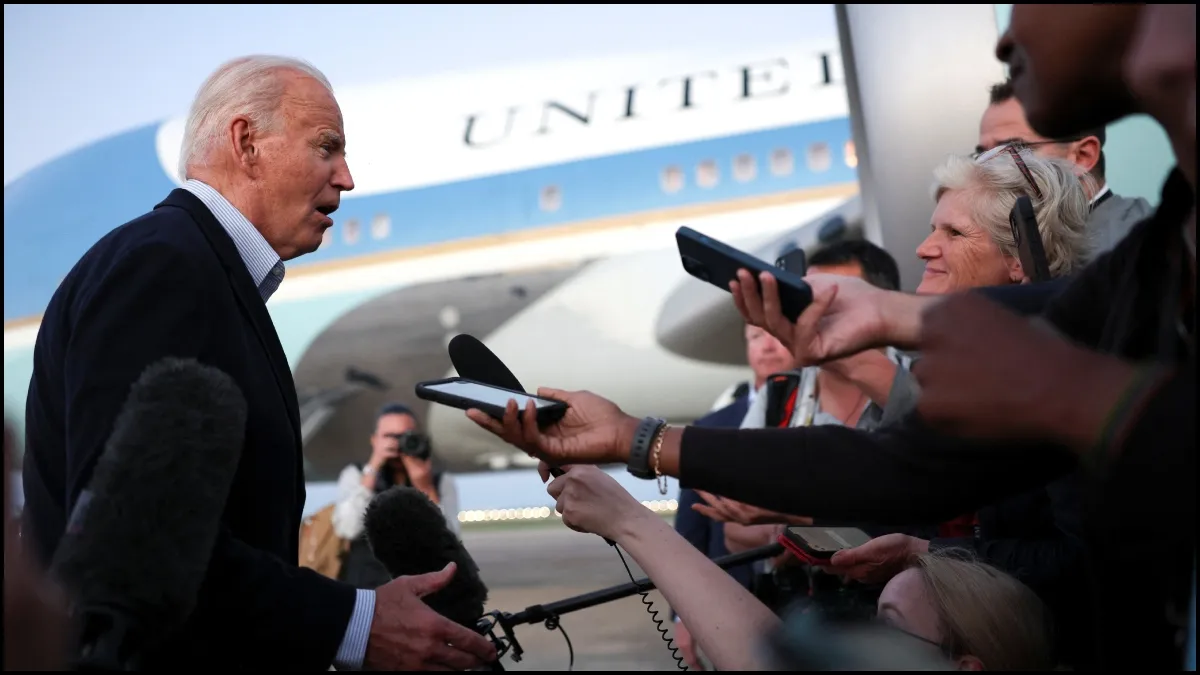Biden says 'don't believe' there will be all-out war in Middle East as Israel plans retaliatory attack on Iran
Biden said more needed to be done to avoid a full-fledged war in the region as it is lending support to Israel for a response to Iran's attack. Biden said the US was discussing with Israel its options about striking Israeli airstrikes, as crude prices across the globe shot up.

Washington: US President Joe Biden said he did not believe there is going to be an "all-out war" in the Middle East as Israel is weighing options for a retaliatory attack after Iran's largest-ever missile attack on Tuesday. At the same time, Israel is also locked in separate conflicts with Iran-backed groups Hezbollah and Hamas in Lebanon and Gaza respectively.
However, Biden said more needed to be done to avoid a Middle East war, as Israel's military hit Beirut with new air strikes in its battle against Hezbollah. "How confident are you it's not going to rain? Look, I don't believe there is going to be an all-out war. I think we can avoid it," he told reporters in Washington on Tuesday. "But there is a lot to do yet, a lot to do yet."
While the United States, the European Union, and other allies have called for an immediate 21-day ceasefire in the Israel-Lebanon conflict, Biden said the US was discussing with Israel its options for responding to Tehran's assault, which included Israel striking Iran's oil facilities. We're discussing that. I think that would be a little... anyway," he said.
Biden on Israel's strikes on Iran
Biden has previously said he would not support Israeli strikes on Iranian nuclear facilities. The price of crude oil shot up by 5 per cent immediately after Biden’s remarks and has now increased by 10 per cent since Iran’s large-scale missile attack on Israel on Tuesday, according to BBC. Asked later if he was urging Israel not to attack Iran's oil installations, Biden said he would not negotiate in public.
Israel had vowed to retaliate against Iran for the missile attack on Tuesday when Tehran launched a salvo of 180 missiles in retaliation to Israel's campaign against Hezbollah. Iranian President Masoud Pezeshkian, speaking in Doha, said Tehran would be ready to respond and warned against "silence" in the face of Israel's "warmongering".
A US official said Washington did not believe Israel had decided yet how to respond to Iran. Israeli Prime Minister Benjamin Netanyahu has vowed Iran will pay for Tuesday's missile attack, and Washington said it would work with its longtime ally to ensure Iran faced "severe consequences."
International community calls for restraint
The Group of Seven nations, which includes the US, Britain and allies, on Thursday condemned Iran's missile attack on Tuesday and reaffirmed their commitment to Israel's security. But the group also called for restraint, a ceasefire in Gaza and a halt to hostilities in Lebanon. "A dangerous cycle of attacks and retaliation risks fuelling an uncontrollable escalation in the Middle East, which is in no one's interest," it said.
Qatar's Emir Sheikh Tamim bin Hamad Al-Thani also urged serious ceasefire efforts to stop what he called Israel's aggression. The chairman of the US House of Representatives Foreign Affairs Committee urged Biden to speed up weapons shipments to Israel, including 2000-pound (907 kg) bombs held up for months over human rights concerns.
Early on Friday, Lebanon's health ministry said 27 people were killed and 151 wounded over the prior day. Hezbollah says it has repelled several land operations by Israeli troops, with measures such as ambushes and direct clashes. The group said it killed 17 Israeli military personnel in combat in southern Lebanon on Thursday, citing its field and security sources.
(with Reuters inputs)
ALSO READ | Israel strikes Beirut, 4 soldiers killed in Lebanon; Biden discusses strikes on Iran | Key POINTS